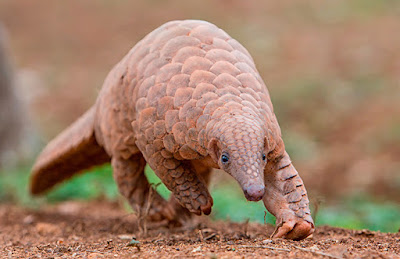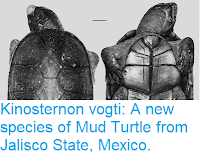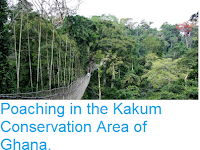The Sindh Wildlife Department has seized about 200 kg of Pangolin scales and about 150 kg of Freshwater Turtle meat in a raid in the Khadda Market area of Karachi on Friday 26 October 2018. Neither of these products is generally used or consumed locally, and are thought to have been destined for (illegal) export to Southeast Asia. Both Pangolin and Turtle products are covered by the Convention on International Trade in Endangered Species (CITES), though Pakistan is known to be a source country for these materials, which are highly valued in parts of Southeast Asia, though it is keen to lose this reputation, and has been taking increasingly strong measures to combat the trade in recent years.
Officials from the Sindh Wildlife Department pose with Pangolin scales seized during a raid in Karachi on 26 October 2018. The Express Tribune.
The Indian Pangolin, Manis crassicaudata, which is the only species found in Pakistan, is listed as Endangered under the terms of the International Union for the Conservation of Nature's Red List of Threatened Species. The species was formerly found across much of Pakistan, India, Bangladesh, and Nepal, though they are now thought to be extinct in Bangladesh, and extinct outside protected areas in Nepal. With no clear information on the species available from India, the Pakistani population, known to be in sharp decline, has become of great interest to conservationists internationally.
Eight species of Freshwater Turtle are found in Pakistan, the Black Pond Turtle, Geoclemys hamiltonii, the Crowned River Turtle, Hardella thurjii, the Brown Roofed Turtle, Pangshura smithii, the Indian Roofed Turtle, Pangshura tectum, the Indian Narrow-headed Softshell Turtle, Chitra indica, the Ganges Softshell Turtle, Nilssonia gangeticus, the Indian Peacock Softshell Turtle, Nilssonia hurum, and the Indian Flapshell Turtle, Lissemys punctata andersonii, of which four are considered to be Vulnerable under the terms of the Red List of Threatened Species (the Black Pond Turtle, the Crowned River Turtle, the Ganges Softshell Turtle, and the Indian Peacock Softshell Turtle), while one is considered to be Endangered (the Indian Narrow-headed Softshell Turtle). All of these are traded as both foodstuffs and medicines in China and Southeast Asia, with Turtles from all over Pakistan being traded through Karachi. The methods used to catch Turtles in Pakistan are often harmful to the environment, with records of explosives, electricity and poison all being used.
See also...
An Indian Pangolin, Manis crassicaudata. Ajit Huilgol/US Fish and Wildlife Service/Wikimedia Commons.
Eight species of Freshwater Turtle are found in Pakistan, the Black Pond Turtle, Geoclemys hamiltonii, the Crowned River Turtle, Hardella thurjii, the Brown Roofed Turtle, Pangshura smithii, the Indian Roofed Turtle, Pangshura tectum, the Indian Narrow-headed Softshell Turtle, Chitra indica, the Ganges Softshell Turtle, Nilssonia gangeticus, the Indian Peacock Softshell Turtle, Nilssonia hurum, and the Indian Flapshell Turtle, Lissemys punctata andersonii, of which four are considered to be Vulnerable under the terms of the Red List of Threatened Species (the Black Pond Turtle, the Crowned River Turtle, the Ganges Softshell Turtle, and the Indian Peacock Softshell Turtle), while one is considered to be Endangered (the Indian Narrow-headed Softshell Turtle). All of these are traded as both foodstuffs and medicines in China and Southeast Asia, with Turtles from all over Pakistan being traded through Karachi. The methods used to catch Turtles in Pakistan are often harmful to the environment, with records of explosives, electricity and poison all being used.
An Indian Narrow-headed Softshell Turtle, Chitra indica. Krishna Kumar Mishra/Wikimedia Commons.
See also...
Follow
Sciency Thoughts on Facebook.









